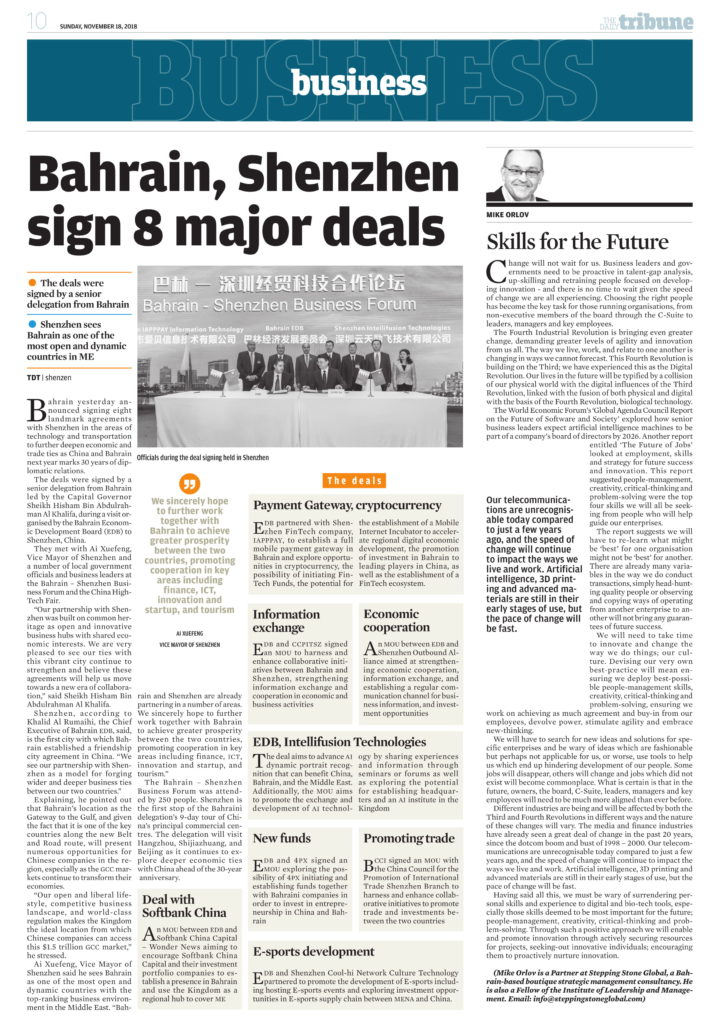
Change will not wait for us. Business leaders and governments need to be proactive in talent-gap analysis, up-skilling and retraining people focused on developing innovation – and there is no time to wait given the speed of change we are all experiencing. Choosing the right people has become the key task for those running organisations, from non-executive members of the board through the C-Suite to leaders, managers and key employees.
The Fourth Industrial Revolution is bringing even greater change, demanding greater levels of agility and innovation from us all. The way we live, work, and relate to one another is changing in ways we cannot forecast. This Fourth Revolution is building on the Third; we have experienced this as the Digital Revolution. Our lives in the future will be typified by a collision of our physical world with the digital influences of the Third Revolution, linked with the fusion of both physical and digital with the basis of the Fourth Revolution, biological technology.
The World Economic Forum’s ‘Global Agenda Council Report on the Future of Software and Society’ explored how senior business leaders expect artificial intelligence machines to be part of a company’s board of directors by 2026. Another report entitled ‘The Future of Jobs’ looked at employment, skills and strategy for future success and innovation. This report suggested people-management, creativity, critical-thinking and problem-solving were the top four skills we will all be seeking from people who will help guide our enterprises.
The report suggests we will have to re-learn what might be ‘best’ for one organisation might not be ‘best’ for another. There are already many variables in the way we do conduct transactions, simply head-hunting quality people or observing and copying ways of operating from another enterprise to another will not bring any guarantees of future success.
We will need to take time to innovate and change the way we do things; our culture. Devising our very own best-practice will mean ensuring we deploy best-possible people-management skills, creativity, critical-thinking and problem-solving, ensuring we work on achieving as much agreement and buy-in from our employees, devolve power, stimulate agility and embrace new-thinking.
We will have to search for new ideas and solutions for specific enterprises and be wary of ideas which are fashionable but perhaps not applicable for us, or worse, use tools to help us which end up hindering development of our people. Some jobs will disappear, others will change and jobs which did not exist will become commonplace. What is certain is that in the future, owners, the board, C-Suite, leaders, managers and key employees will need to be much more aligned than ever before.
Different industries are being and will be affected by both the Third and Fourth Revolutions in different ways and the nature of these changes will vary. The media and finance industries have already seen a great deal of change in the past 20 years, since the dotcom boom and bust of 1998 – 2000. Our telecommunications are unrecognisable today compared to just a few years ago, and the speed of change will continue to impact the ways we live and work. Artificial intelligence, 3D printing and advanced materials are still in their early stages of use, but the pace of change will be fast.
Having said all this, we must be wary of surrendering personal skills and experience to digital and bio-tech tools, especially those skills deemed to be most important for the future; people-management, creativity, critical-thinking and problem-solving. Through such a positive approach we will enable and promote innovation through actively securing resources for projects, seeking-out innovative individuals; encouraging them to proactively nurture innovation.
